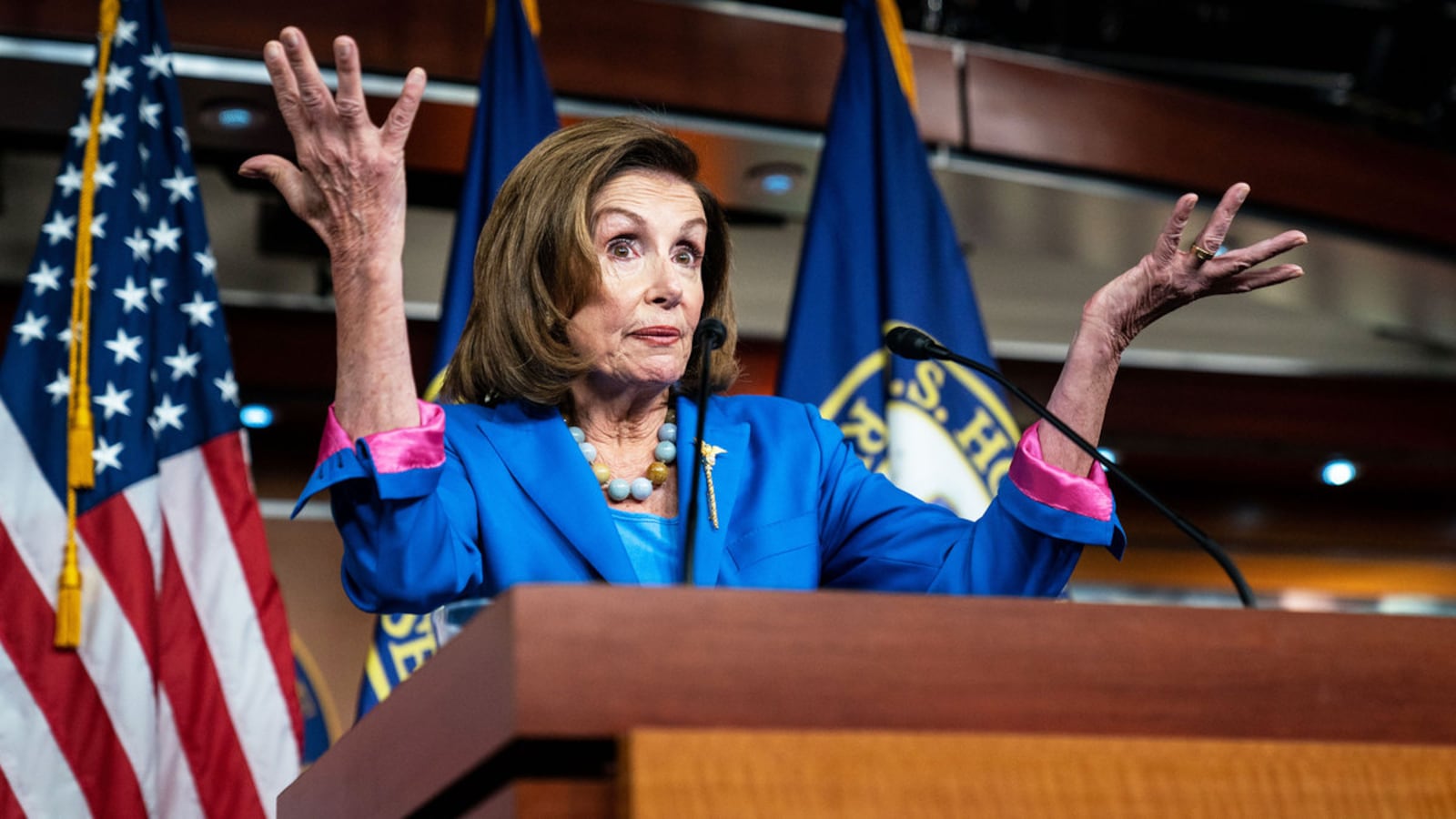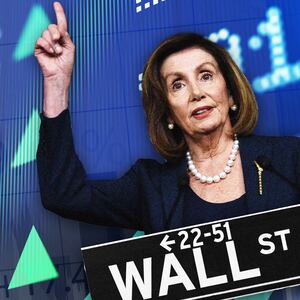Democrats have the opportunity to do something that is good for the country, that would be commonsensical and populist. So why won’t Nancy Pelosi let them?
I’m talking about the “Ban Congressional Stock Trading Act,” introduced by the Democratic senators Mark Kelly and Jon Ossoff. This legislation (like a similar bill offered by Republican Josh Hawley) would prohibit members of Congress and their families (such as Pelosi’s husband, Paul Pelosi) from buying and selling stocks while they serve. It would help combat the growing consensus that the game is rigged for the powerful and connected—a sentiment shared by top Biden economic adviser Brian Deese.
Indeed, among some observers, the idea that top political leaders aren’t engaged in insider trading has become a joke. As NPR’s Tim Mak recently reported, “Among a certain community of individual investors on TikTok, House Speaker Nancy Pelosi’s stock trading disclosures are a treasure trove.” In fact, Mak writes, “you can get a push notification every time Pelosi’s stock trading disclosures are released.”
First, though, a brief (recent) history of this toxic problem is in order.
In the midst of the financial meltdown, on Sept. 16, 2008, Treasury Secretary Hank Paulson and Federal Reserve Chairman Ben Bernanke held a secret meeting with members of Congress. The result, as Business Insider noted, was that “Congressmen privy to this information reacted—not by dropping everything and drawing up a plan to save the economy, but by dumping stock and avoiding the losses everyone else would take in the coming month. Others bought stocks in financial firms that would later be saved by the federal government.”
This event is detailed in a 2011 book—Peter Schweizer’s “Throw Them All Out”—which, in turn, inspired a segment on CBS’s 60 Minutes. But the story wasn’t just about the financial meltdown.
One of the politicians featured in the segment was Nancy Pelosi, who participated in a 2008 Initial Public Offering from Visa, as 60 Minutes noted, “just as a troublesome piece of legislation that would have hurt credit card companies, began making its way through the House. Undisturbed by a potential conflict of interest, the Pelosis—whose net worth is well over $100 million—purchased 5,000 shares of Visa at the initial price of $44 dollars. Two days later it was trading at $64. The credit card legislation never made it to the floor of the House.”
This is a bipartisan problem, and Pelosi was far from the only lawmaker featured in that memorable 60 Minutes episode that helped spark passage of the The Stop Trading on Congressional Knowledge (STOCK) Act—a flawed piece of legislation codifying that it it is illegal for members of Congress to use “any nonpublic information derived from the individual’s position… or gained from performance of the individual’s duties, for personal benefit.”
At least, that’s what the law is supposed to do. The real test would come during the next crisis, which turned out to be the COVID-19 pandemic. Despite the law, members of Congress who received coronavirus briefings in early 2020 again made suspicious stock trades just after they found out, just ahead of the public and the markets , how bad the pandemic could be.
Despite the STOCK Act, none of the members received any serious punishment.
That’s because it’s nearly impossible to prove that someone acted solely on insider information. Perhaps this is why Pelosi, under pressure from her own party to actually ban stock trading for members and their families, is suggesting stiffer penalties for anyone who breaks the STOCK Act (in fairness, the fines are ridiculously small), rather than enact a more sweeping ban on lawmakers playing the markets.
It’s fair to say that the STOCK Act hasn’t accomplished its stated goal—and that in the decade since it became law, Pelosi hasn’t done anything to avoid the appearance of impropriety.
On Dec. 22, 2020, for example, Paul Pelosi invested between $500,000 and $1 million in 25 call options of Tesla stocks. Why is that a problem? As the AP reported, Joe Biden “signed his executive order directing federal officials to transition federal, state, local and tribal government fleets to ‘clean and zero-emission vehicles’ on Jan. 27”—less than five weeks after Pelosi’s investment.
The perception that the Pelosis may be profiting off of information she receives as Speaker of the House is problematic; as is the fact she is profiting from things she says are bad. According to Business Insider, the same day Pelosi called Facebook “shameful” and “irresponsible,” her husband was purchasing shares of Facebook, at a below market rate, that he would later sell for a hefty profit. Pelosi and her team claim that “The Speaker does not own any stocks. But, of course, her husband does, making this a distinction without much of a difference (which is why this new proposed legislation bans spouses from buying and selling stocks.)
Last month, in response to Rep. Alexandria Ocasio-Cortez’s tweet saying that, “It is absolutely ludicrous that members of Congress can hold and trade individual stock while in office,” Pelosi was forced to confront her opposition to this reform. In an instant, this San Francisco liberal transformed into a Club for Growth conservative, insisting that “We are a free-market economy.”
I’m sure capitalism could survive Nancy Pelosi (and her husband) not being allowed to bet on the market while she is a member of Congress.
It’s rare that I side with AOC, but she’s right on this one. Banning lawmakers and their families from trading stocks would show that Democrats are holding themselves accountable, and using the majority they have been given to actually make politics less swampy. This appearance of impropriety, alone, is contributing to the erosion of trust in our institutions—a plague that, among other externalities, helped lead to the election of Donald Trump. And, of course, it would be a wildly popular thing for Democrats to do, heading into the 2022 midterm elections.
So why won’t Nancy Pelosi, who once promised that Democrats would deliver “the most honest, most open, most ethical Congress in history,” support it?
I can think of more than 100 million reasons, but none of them are any good.


